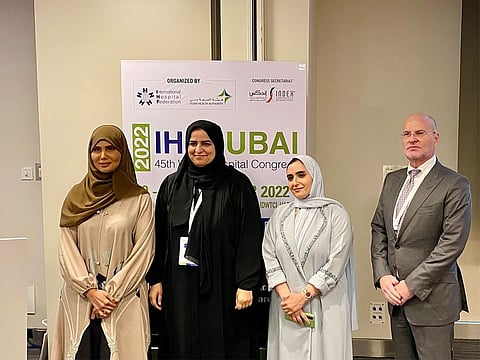UAE: Need to raise profile of nurses beyond 'heroism' stressed
IHF World Hospital Congress in Dubai hears viewpoints of community long hailed as heores

Dubai: While frontline healthcare workers have been hailed as heroes throughout the COVID-19 pandemic, nurses want their profiles raised.
The intensely challenging work experience during the pandemic has led nurses to evolve professionally and they are now seeking more recognition, rather than compliments, heard the 45th World Hospital Congress (WHC) of the International Hospital Federation (IHF) in Dubai.
Speaking at a session focused on the nursing workforce, three top nursing executives in the UAE shared lessons learned during the COVID-19 pandemic and the way forward that has been envisaged to enhance employee engagement and professional development, maintain a healthy work-life balance and have open dialogues with nurses.
While surveys from the US and UK showed that nurses looked at their professional roles beyond heroism during the pandemic, a national study conducted in the UAE also did find similar sentiments, said Dr Sumaya Mohammed AlBlooshi, president of Emirates Nursing Association and director of Nursing Department, Emirates Health Services (EHS).
However, there was a difference in what the nurses in the UAE experienced. They did not fall short of resources, Dr AlBlooshi pointed out.
“Thank God the UAE is one of the countries which fought the pandemic so well and we became a pioneer in the high coverage rate of vaccination. We did very well and we never had a lack of resources or PPE,” she said.
Dr AlBlooshi said the wellness of the healthcare staff was very important for the leadership.
“Therefore, the first thing that we did during COVID is the capacity building and upskilling programme.”
Resource planning
Nurses were made part of resource planning and management. Teams were formed to support nurses and their families who became COVID positive. Programmes were launched to address their mental health concerns, she explained.
“Getting recognition is one of the important things for our nurses. It’s not always by money but many other strategies that make nurses feel what the frontline staff need from their line manager and the line manager needs from the middle management and so on,” she added.
To address this, a shared-governance model was implemented across the EHS hospitals and facilities, she said. The national, regional and local strategic directions are towards empowering and strengthening the nursing profession, said Dr AlBlooshi who is also leading the National Committee for Nursing and Midwifery Affairs.
At EHS, for example, she said, nurses are working on team-based practices. “This is what the nurses want to say. We want to be part of the team. We are all together, working to serve the patients, our communities. We don’t want to say that the doctors are the best or nurses are the best, but what is best is that all of us are in one team in order to enhance the safety of patients.”
“We don’t want somebody to tell us that you are angels and your job is humanitarian. We have to reach a stage to come up with a team and sit together and talk together. We want [to work as] a team for our patient safety.”
Roadmap for nurses
Dr AlBlooshi said the country’s roadmap for nurses is going to boost the profession. The National Strategy for Nursing and Midwifery—Roadmap for 2026 is based on five pillars. They are: effective regulation, governance and leadership; sustainable nursing/midwifery workforce management system; quality and innovative education and professional development; transformative practice, service and quality care; and advanced research, evidence-based practice responsive to national health priorities.
“Each organisation at the country level has to adopt this national strategy… These are important pillars to support nurses, to empower themand others. This will soon be available online,” said Dr AlBlooshi.
Speaking on the topic “how the pandemic shaped the future of nursing professions,” Aysha Ali Al Mahri, group chief nursing officer, Abu Dhabi Health Services Company (SEHA), said COVID taught us two things. “One, unrealised potential in the use of digital health, especially in nursing practices, and two, the need for certain privileges to be added to the nursing practice.”
Speaking of the challenges faced during the pandemic, Al Mahri said nurses came out of their comfort zone and rose to the occasion by multitasking. Nurses got involved in workforce management and operational affairs to ensure smooth care delivery. They were doing administrative jobs as most office staff worked from home, training newly recruited nurses while treating the patients from the front line.
To support the nurses verbalise their concerns during the pandemic, she said SEHA launched a special platform.
“It’s called Tamkin Tamreed, which means empowering the nurses. This platform was developed only for the nursing staff to raise their concerns directly to the group CNO (chief nursing officer).”
Another taskforce was created to address the psychological concerns of the nurses during the pandemic. Over time, it was expanded to cover all the employees and the leadership has now decided to continue with it, Al Mahri added.
High quality care
Speaking about supporting nurses and midwives to deliver compassionate and high quality care post COVID-19, Maryam Al Blooshi, director of nursing, Dubai Academic Health Corporation, said the Royal College of Nursing in the UK has recommended an ‘ABC’ model which stands for autonomy, belonging and contribution. “You could break down each element and embrace it and integrate it in your strategic plans, operational plans and professional development plans.”
Post-pandemic, she said, nurses would want their profession to be known more as ‘anti-fragile’ rather than resilient “because resilience is looking back but anti-fragile is preparing ourselves to do our best in the future.”
During the panel discussion moderated by Michael Davis, CEO, NMC Healthcare, the speakers also proposed to uplift and raise the profile of nurses by upskilling them, having independent regulations for their field and monetising their services. The nursing leaders also highlighted the importance of nursing informatics and the use of evidence-based data in further advancing the profession.


